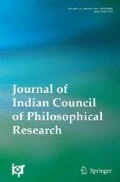Abstract
Political philosophers often grapple with the issue of the legitimacy of state coercion. Aristotle, a perfectionist, opines that all men hold an objective account of the good life. As regards legitimacy, he entails that state policies are justified only when all its members comprehend the value that has been identified in accordance with the true notion of good. Aristotle argues that the state should facilitate the encouragement of objectively valuable notions of the good. Ronald Dworkin, a neutralist, proposes a specific model of the good life so that one can live well. He holds that certain elements of the ethical conception lead to various notions of the good and, in matters of legitimacy, the state should be neutral towards the notion of good. This is so because A cannot make B’s life better by way of the coercive means of the state. This paper throws light on Aristotle’s and Dworkin’s dialogues on the moral foundations of legitimacy (conceived during their notion of the good life). Therefore, I argue that, in contrast to perfectionism, Dworkin justifies his liberal principle of legitimacy through the idea of state neutrality. But, eventually, Dworkin’s arguments overlook his ethical foundation or admissible towards perfectionism, which is emaciated enough to offer any justification for the principle of legitimacy.
Similar content being viewed by others
Notes
This theory assumes a hypothetical condition under which one would find it rational to make a mutual agreement to enter in the legitimacy of authority.
The strategy of the original position is to build a method of reasoning that models abstract ideas about justice so as to focus their power together onto the choice of principles.
Because at that time utilitarianism was a predominant theory for the most modern moral philosophy, represented by a long line of writers.
In its first stage, citizens decide for themselves what makes a life successful for them and, in its second stage, contrive to distribute success, to be defined, according to some formula they take to be fair.
Ethical integrity or endorsement as a necessary condition for the Good life is already inherent in this claim.
A person’s life can be improved by forcing him into some act or abstinence that he thinks is valueless.
In this paternalism, coercion is justified on the ground that the behaviour implantation is good or the behaviour excise is bad for people.
This paternalism justifies prohibition by pointing not to the negative aspect of what it prohibits but to the positive value of the substitute lives that makes it available.
References
Allmark, P. J. (2008). An Aristotelian account of autonomy. Journal of Value Inquiry,42(1), 41–53.
Bartlett, R. C., & Collins, S. D. (2011). Arostotle’s Necomachean Ethics (trans.). Chicago: The University of Chicago Press.
Berlin, I. (1969). Four essays on liberty. New York: Oxford University Press.
Breede, C. (2009). The challenge of nation-building: Insights from aristotle. Journal of Conflict Studies,29, 143–162.
Drerup, J. (2015). Autonomy, perfectionism and the justification of education. Studies in Philosophy and Education,34(1), 63–87.
Dworkin, R. (1993). Life’s dominion: An argument about abortion, euthanasia and individual freedom. New York: Knopfler.
Dworkin, R. (2002). Sovereign virtue: The theory and practice of equality. Cambridge: Harvard University Press.
Dworkin, R. (2011). Justice for hedgehogs. Cambridge: The Belknap Press of Harvard University Press.
Hursthouse, R. (1980–81). A false doctrine of the mean. In Proceedings of the Aristotlian society. Oxford: Oxford University Press, 81(1), 57–72.
Kohen, G. (2012). The archer and Aristtotle’s doctrine of the mean. Examina Antiqua,1(3), 155–167.
Kraut, R. (2007). What is good and why: the ethics of well-being. Cambridge: Harvard University Press.
Lehning, P. B. (2009). John Rawls: An introduction. Cambridge: Cambridge University Press.
Mang, F. F. L. (2013). Liberal neutrality and moderate perfectionism. Res Publica,19(4), 297–305.
Nozick, R. (1994). Anarchy, state and Utopia. New York: Basic Books.
Rawls, J. (1971). A theory of justice. Oxford: Oxford University Press.
Raz, J. (1986). The morality of freedom. Oxford: Clarendom Press.
Shiffrin, S. (2004). Autonomy, beneficence, and the permanently demented. In J. Burley (Ed.), Dworkin and his critics: With replies by Dworkin (pp. 195–217). Oxford: Blackwell Publishing.
Wall, S. (1998). Liberalism, perfectionism and restraint. Cambridge: Cambridge University of Press.
Wolfe, C. (1994). Liberalism and paternalism: A critique of Ronald Dworkin. The Review of Politics,56(4), 615–640.
Zelleke, A. (2005). Distributive justice and the argument for an unconditional basic income. The Journal of Socio-Economics,34, 3–15.
Author information
Authors and Affiliations
Corresponding author
Additional information
Publisher's Note
Springer Nature remains neutral with regard to jurisdictional claims in published maps and institutional affiliations.
Mayavee Singh: Former in Goa University, Taleigão, India.
Rights and permissions
About this article
Cite this article
Singh, M. The Notion of Good Life: A Dialogue on the Moral Foundations of Legitimacy. J. Indian Counc. Philos. Res. 37, 83–95 (2020). https://doi.org/10.1007/s40961-020-00191-w
Received:
Accepted:
Published:
Issue Date:
DOI: https://doi.org/10.1007/s40961-020-00191-w



